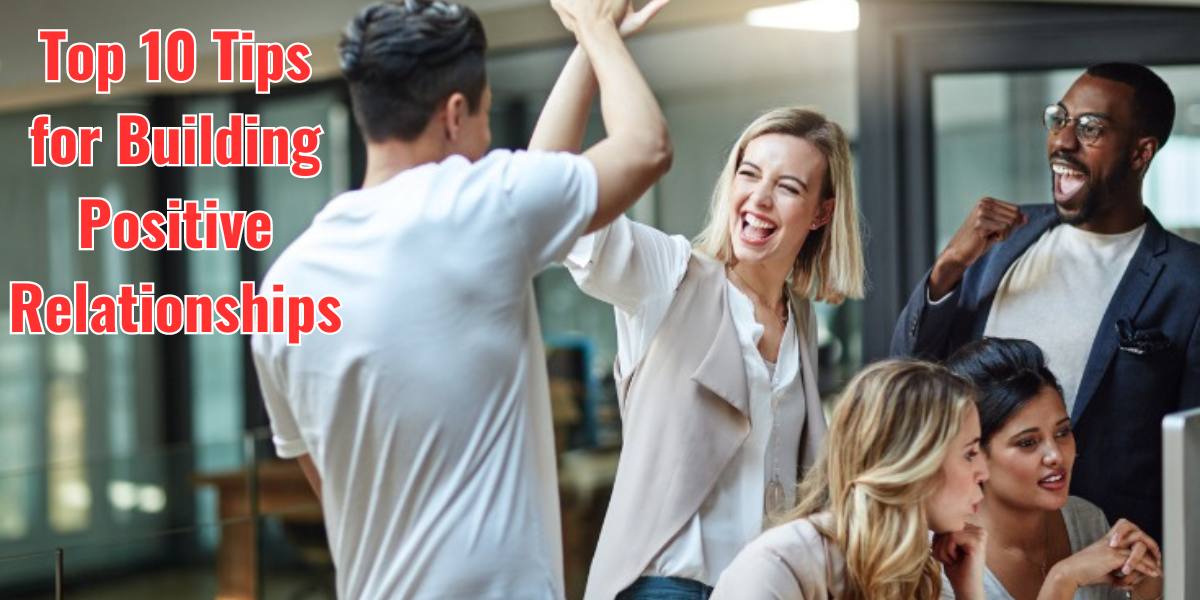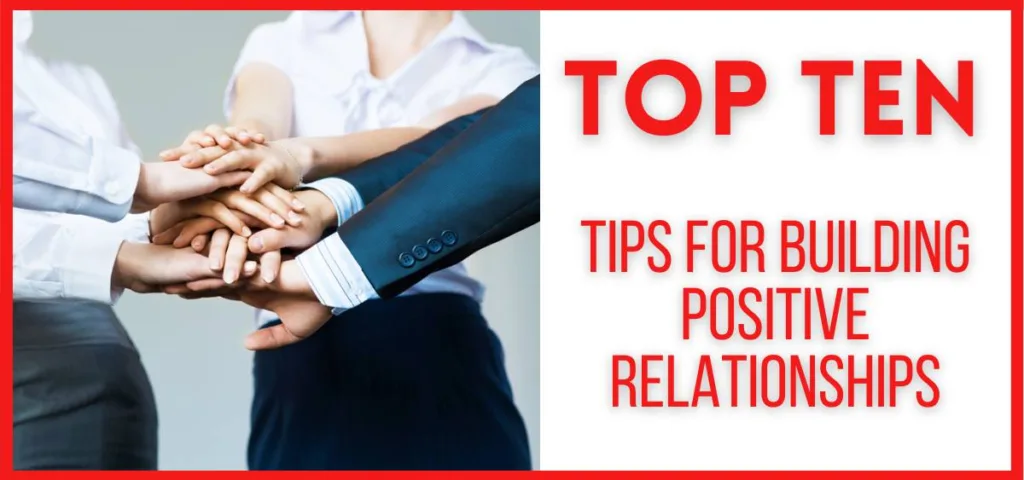Building positive relationships involves honesty, trust, respect, and open communication between partners and even in working environments, requiring effort and compromise from both individuals. In healthy relationships, there’s no imbalance of power; partners honor each other’s independence, allowing them to make decisions without fear of retribution or retaliation, and share decision-making responsibilities. The profound connection we share with other human beings is one of life’s most significant experiences. Positive and supportive relationships contribute to our overall well-being, fostering feelings of health, happiness, and satisfaction. Here are a few tips to help you develop more positive and healthy relationships in all areas of your life:
Also, read: Top 10 DIY Upcycling Projects for Sustainable Home Decor in 2024
Understanding the Importance of Positive Relationships
Building positive relationships is about more than just being friendly or courteous. It’s about creating meaningful connections based on mutual respect, trust, and understanding. Positive relationships contribute to our overall well-being by providing support, companionship, and a sense of belonging. Research has shown that people with strong social connections tend to live longer, healthier lives and experience greater levels of happiness and satisfaction. By investing time and effort into cultivating positive relationships, we can enhance our quality of life and create a supportive network of individuals who uplift and empower us.
Bonding Better: Top 10 Tips for Building Positive Relationships
In a world where connections are key, fostering positive relationships is crucial not only for personal happiness but also for professional success. Whether it’s with family, friends, colleagues, or acquaintances, the ability to build and maintain positive relationships can enrich our lives in countless ways. In this comprehensive guide, we’ll delve into the top 10 tips for nurturing strong and positive relationships, offering actionable advice and insights that you can start implementing today.

Also, read: Top 10 Personalized Meal Planning Apps in 2024
1. Be a good friend and partner
Friendship and partnership aren’t just titles; they’re verbs. Being a good person demands effort, but the rewards are priceless. It starts with honesty and authenticity—letting your true self shine. Actively listen with open ears and an open heart, truly understanding each other’s joys and struggles. Be reliable and trustworthy, a rock they can lean on, always there with a hand to hold. Celebrate their successes as your own, offering encouragement and support through tough times. Remember, respect goes beyond words.
Value their opinions, boundaries, and feelings, even when you disagree. Be empathetic and compassionate, putting yourself in their shoes and offering a shoulder to cry on. Don’t forget the power of positivity and humor, lifting their spirits and bringing laughter to their days. And remember, relationships are a two-way street. Forgive mistakes and be open to growth, both yours and theirs. By nurturing these qualities, you become not just a friend or partner but a cherished companion, walking life’s journey side-by-side.
2. Practice active listening
The secret weapon in your relationship arsenal isn’t advice or witty banter, but active listening. Forget multitasking and internal planning; truly connecting starts with giving someone your undivided attention. Make eye contact, nod encouragingly, and resist interrupting. Ask open-ended questions that go beyond “yes” or “no,” and paraphrase what you hear to ensure understanding. This isn’t just about collecting information; it’s about validating their feelings and fostering trust.
When you truly listen, you build bridges of empathy, create a safe space for sharing, and show genuine interest in who they are. Remember, it’s not about “fixing” things; it’s about being present and supporting their journey. So, put away distractions, embrace silence, and unleash the power of active listening to build stronger, more meaningful relationships.
Also, read: Top 10 Creative Skills Every Person Should Know in 2024
3. Be genuine and authentic
In a world of filters and facades, genuine authenticity stands out. It’s the foundation for building positive relationships, attracting those who connect with your true self, and fostering trust that allows connections to blossom. Authenticity means embracing your strengths and weaknesses, expressing your unique thoughts and feelings, and standing by your values. It’s about being comfortable in your skin, allowing vulnerability without fearing judgment.
This doesn’t require perfection; it’s about being real, owning your quirks, and celebrating your individuality. When you’re genuine, you attract others who appreciate your honesty and transparency, creating connections built on mutual respect and understanding. Remember, authenticity isn’t a performance; it’s a journey of self-discovery and acceptance, allowing you to build genuine connections that enrich your life. So, shed the masks, express your true self, and watch your relationships flourish with authenticity as your guiding light.
4. Establish Trust and Mutual Respect
Trust and mutual respect form the foundation of any positive relationship. Without these essential elements, relationships are prone to conflict and misunderstandings. To build trust, be honest, reliable, and consistent in your words and actions. Show respect for others’ opinions, feelings, and boundaries, even when you disagree. By demonstrating integrity and empathy, you can earn the trust and respect of those around you.
Also, read: Top 10 Language Learning Apps for Global Communication in 2024
5. Communicate Effectively
Effective communication is essential for building and maintaining positive relationships. Listen attentively to others, validate their feelings, and express yourself clearly and respectfully. Be open to feedback and willing to resolve conflicts through constructive dialogue. Avoid making assumptions or jumping to conclusions, and strive to understand others’ perspectives before responding. By communicating openly and honestly, you can strengthen your connections and foster greater intimacy and trust.
6. Show Empathy and Compassion
Empathy and compassion are powerful catalysts for building positive relationships. Take the time to understand others’ emotions and experiences, and offer support and encouragement when needed. Practice active listening and validate others’ feelings without judgment or criticism. Show kindness and generosity in your interactions, and be willing to lend a helping hand or a sympathetic ear. By demonstrating empathy and compassion, you can deepen your connections and create a supportive network of individuals who care about your well-being.
Also, read: Top 10 Mindfulness Habits for a Calmer You
7. Cultivate Shared Interests and Activities
Shared interests and activities can strengthen bonds and create opportunities for meaningful interaction. Seek out common hobbies, passions, or goals that you can pursue together with others. Whether it’s joining a sports team, volunteering for a cause, or attending cultural events, shared experiences can foster camaraderie and connection. Be proactive in organizing activities or gatherings that bring people together and create lasting memories. By cultivating shared interests, you can build rapport and create a sense of community with those around you.
8. Respect Boundaries and Autonomy
Respecting boundaries and autonomy is essential for maintaining healthy and positive relationships. Recognize that everyone has their own limits, preferences, and personal space. Be mindful of others’ boundaries and avoid imposing your expectations or demands on them. Seek consent and permission before sharing personal information or engaging in physical contact. Respect others’ privacy and autonomy, and refrain from pressuring them into situations they’re uncomfortable with. By honoring boundaries and autonomy, you can build trust and mutual respect in your relationships.
Also, read: Top 10 Best Pet Sitting Apps in 2024
9. Practice Forgiveness and Letting Go
Forgiveness is a key component of building and maintaining positive relationships. Holding onto grudges or resentments only breeds negativity and resentment. Instead, practice forgiveness and let go of past grievances or conflicts. Acknowledge mistakes and shortcomings, both in yourself and others, and strive to move forward with compassion and understanding. By practicing forgiveness and letting go, you can release the burden of resentment and create space for healing and reconciliation in your relationships.
10. Invest Time and Effort
Building positive relationships requires time, effort, and commitment. Prioritize spending quality time with the people who matter most to you, whether it’s family, friends, or colleagues. Make an effort to stay connected through regular communication, shared activities, and meaningful interactions. Show appreciation for others’ presence and contributions, and be willing to invest in the growth and development of your relationships. By prioritizing relationships and investing time and effort, you can nurture strong and lasting connections that enrich your life.
Also, read: Top 10 Hobbies for Mental Wellbeing
FAQs: Tips for Building Positive Relationships
Q: How can I build positive relationships in a fast-paced digital world?
Focus on quality interactions over quantity. Prioritize authentic conversations, even online, and actively listen to build virtual rapport. Utilize video calls and shared online experiences to deepen connections.
Q: What are some red flags to watch out for in building relationships?
Be wary of individuals who are overly critical, manipulative, or disrespectful of your boundaries. Watch out for one-sided relationships where you feel unheard or unsupported.
Q: Is it okay to say “no” to protect my well-being in relationships?
Absolutely! Setting healthy boundaries is crucial for positive relationships. Communicate your needs assertively and don’t be afraid to prioritize your own mental and emotional well-being.
Read, this: Top 10 DIY Home Decor Projects for the Creative American in 2024
Q: How can I navigate disagreements in my relationships without creating conflict?
Practice active listening, communicate respectfully, and focus on understanding the other person’s perspective. Acknowledge your differences and work towards solutions that benefit everyone.
Q: Are there any quick tips for fostering positivity in my relationships?
Express gratitude frequently, offer genuine compliments, and celebrate small victories together. Show interest in their lives, be an active listener, and practice empathy.
Read, more: Top 10 Healthy Comfort Food Recipes for Busy Americans
Q: I’m shy and find it hard to connect with new people. Any advice?
Start small! Join online communities or groups related to your interests. Attend local events or volunteer activities. Remember, everyone feels shy sometimes, and most people appreciate friendly introductions.
Q: What’s the best way to deal with toxic relationships?
If a relationship is causing you emotional harm, prioritize your well-being. Set clear boundaries, communicate your concerns, and seek support from trusted friends or professionals. Remember, you deserve healthy, positive relationships.
Also, read: Top 10 Wellness Retreats in the USA to Recharge and Rejuvenate
Q: How can I maintain positive relationships over long distances?
Schedule regular video calls or phone conversations. Send thoughtful messages or care packages. Make an effort to visit in person whenever possible. Utilize technology to stay connected and share experiences, even virtually.
Q: What are some healthy ways to handle arguments in romantic relationships?
Focus on problem-solving rather than blame. Use “I” statements to express your feelings and needs. Practice active listening and acknowledge the other person’s perspective. Take breaks if emotions run high and come back to the conversation when calmer.
Q: How can I build positive relationships with people from different backgrounds?
Be open-minded and curious about their experiences. Ask respectful questions and actively listen to their perspectives. Celebrate cultural differences and learn from each other. Remember, empathy and understanding are key to building bridges across divides.
Conclusion: The Final Words
Building positive relationships is a cornerstone of a fulfilling life. It’s not just about having people around; it’s about nurturing connections that bring joy, support, and growth. Remember, it’s a journey, not a destination. Every step you take towards building positive relationships is a step towards a more fulfilling life.
So, as you embark on this journey, be patient with yourself. It takes time to develop deep, meaningful connections. Don’t be afraid to put yourself out there and be vulnerable. Remember, everyone is seeking connection. By being open and honest, you’ll attract people who appreciate your authenticity.


































